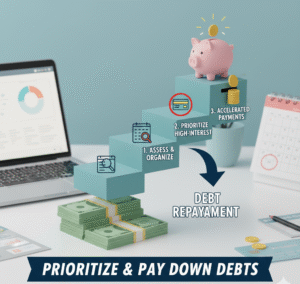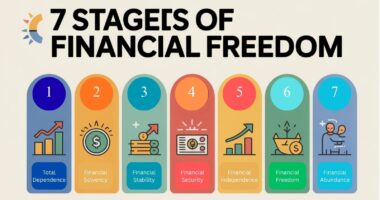Ultimately, effectively managing debt is vital for both personal and business finances. In simple terms, debt is money that is borrowed and must be repaid with interest over time. For example, borrowing for education or business can build wealth, whereas high-interest credit card debt on everyday purchases can harm your finances. Therefore, plan carefully and set clear goals for reducing debt while maintaining stability.
Create and Stick to a Budget
First, list all your income and expenses in a simple budget. Moreover, by tracking spending and income carefully, you can avoid taking on new debt and ensure you can cover your payments. Additionally, creating a household budget — and sticking to it — helps you stay on top of debt payments. In business, a cash-flow plan plays the same role: it clarifies what you can afford each month. Furthermore, stop incurring new debt by limiting credit card use and unnecessary borrowing. These steps ensure you have a clear financial plan and a cushion for emergencies.
Prioritize and Pay Down Debts

Next, focus on reducing existing debt. First, begin by listing all debts with their balances, interest rates, and monthly payments. Then choose a repayment strategy. For example, the Debt Avalanche strategy directs extra payments to the debt with the highest interest rate. You pay the minimum on all debts and apply any extra money to that highest-rate debt until it’s gone, saving money on interest. In contrast, the Debt Snowball strategy targets the smallest balances first, yielding quick wins. These structured strategies help you pay off debts efficiently.
Avalanche Method
With the avalanche method, always pay the minimum on all debts except the one with the highest interest rate. Then put extra funds toward that debt until it’s gone.
Snowball Method
With the snowball method, list debts from smallest to largest. Pay minimums on all debts except the smallest, and apply any extra payments to that smallest balancedfpi.ca.gov. Once it’s paid off, roll that payment into the next smallest debt.
Consolidation and Negotiation
If interest rates are high, consider ways to simplify or lower your payments. For example, transfer balances to a 0% introductory credit card or take out a debt consolidation loan at a lower raterepublicebank.com. Consolidating rolls multiple debts into one payment, often at a lower interest rate. Additionally, negotiate with lenders. You may be able to settle or adjust your repayment plan by asking for better terms. Also, always get any new agreement in writing. This way, you truly reduce costs instead of just moving debt around.
Maintain Financial Discipline
Finally, stay disciplined and track your progress. Additionally, regularly review your budget and adjust it as income or expenses change. Also, avoid accumulating more debt. For example, use credit cards only for planned expenses you can pay off each monthameriprise.com. For a business, look for ways to boost cash flow. For instance, a business can increase sales or cut costs, and individuals can seek extra income or trim spendingsesloc.org. Consequently, through continuous monitoring and control, you keep debt from growing and maintain a path to financial health.
In conclusion, managing debt takes planning and patience. Importantly, by creating a realistic budget, saving for emergencies, and using structured repayment strategies, you improve both personal and business finances. Additionally, consolidating high-rate debts and negotiating terms can reduce interest costs. For especially difficult cases, consider professional advice from a credit counselor or financial advisor. Ultimately, staying disciplined and reviewing your plan regularly will keep you on track toward long-term financial health.









